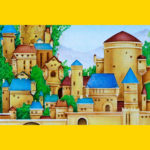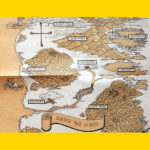Serious nerd history lesson incoming.
The first Dungeons & Dragons videogame came out in 1982
for the Intellivision, but the burgeoning industry was already under the tabletop
game’s influence. By 1980, two games represented a kind of fork in the
philosophical road for computerized RPGs. Rogue focused on the dangers of
dungeon crawling and complex rule sets that verged on the mystical – it was
essentially a simulation of D&D mechanics where stories emerged from the
action without narrative guidance. Down the other path lay Zork.Zork was developed by students at MIT from 1977 to 1979. It was
inspired by Will Crowther’s 1975 mainframe game Colossal Cave Adventure that,
though it lacked monsters, was directly inspired by Dungeons & Dragons
sessions (which included Zork writer and Infocom founder Dave Lebling). Zork
was definitely fantasy, though, with a vast underground empire to explore,
treasures to find and monsters to fight (or be eaten by, if we’re talking about
the darkness dwelling Grue).Zork is an interactive fiction, that is, everything is
presented as text. You direct your actions by typing them into the command line
and a bit of code known as a text parser acts as a kind of dungeon master (Zork
III’s subtitle actually is Dungeon Master, come to think of it), interpreting
your commands and telling you their consequences. If the Dave Arneson school of
D&D thought sought to have players inhabit the fantasy stories he read and
loved, then Zork is perhaps the closest we’ve come to that Platonic ideal.I love Zork. It is as old as I am, has no flashy graphics,
and yet remains my favorite videogame of all time. It stoked my imagination as
no other videogame has, but in ways similar to D&D. As a kid, peering at
the green monochrome screen, trying (and mostly failing) to work out the devious
puzzles. I didn’t make much of a distinction between Zork and Dungeons &
Dragons. Even though they didn’t share a brand name, I knew they were both
facets of a larger world.Interactive fiction mostly died out in the late 80s, leaving
the mechanical influence of D&D to dominate videogames until recent years,
when technology has allowed complex narrative to remarry rules systems in
something that approximates the experience of telling a story with friends
around the gaming table. Sort of. But I’m getting ahead of myself…




